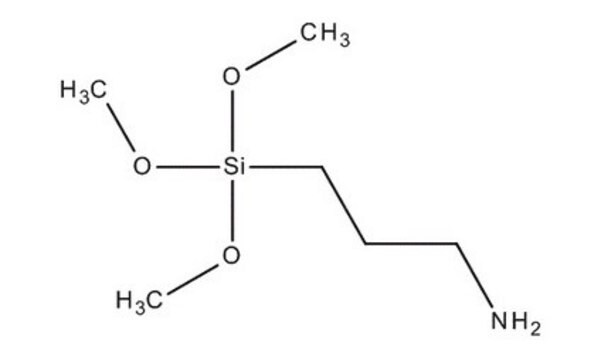741442
(3-Aminopropyl)triethoxysilane
≥98.0%
Synonym(s):
APTS, 3-Triethoxysilylpropylamine, APTES
About This Item
Recommended Products
Quality Level
Assay
≥98.0%
form
liquid
color
APHA: ≤25
refractive index
n20/D 1.421
bp
217 °C/760 mmHg (lit.)
density
0.929 g/mL at 25 °C
0.946 g/mL at 25 °C (lit.)
SMILES string
CCO[Si](CCCN)(OCC)OCC
InChI
1S/C9H23NO3Si/c1-4-11-14(12-5-2,13-6-3)9-7-8-10/h4-10H2,1-3H3
InChI key
WYTZZXDRDKSJID-UHFFFAOYSA-N
Looking for similar products? Visit Product Comparison Guide
General description
Application
Signal Word
Danger
Hazard Statements
Precautionary Statements
Hazard Classifications
Acute Tox. 4 Oral - Eye Dam. 1 - Skin Corr. 1B - Skin Sens. 1
Storage Class Code
8A - Combustible corrosive hazardous materials
WGK
WGK 1
Flash Point(F)
195.1 °F - closed cup
Flash Point(C)
90.6 °C - closed cup
Choose from one of the most recent versions:
Already Own This Product?
Find documentation for the products that you have recently purchased in the Document Library.
Customers Also Viewed
Articles
A hard disk drive (HDD) is a data storage device that stores digital information by magnetizing nanosized magnets on flat disks and retrieves data by sensing the resulting magnetic field.
atomic layer deposition (ALD), microelectronics, Mo:Al2O3 films, nanocomposite coating, photovoltaics, semiconductor devices, W:Al2O3 films, composite films, layer-by-layer
A hard disk drive (HDD) is a data storage device that stores digital information by magnetizing nanosized magnets on flat disks and retrieves data by sensing the resulting magnetic field.
Spin-based electronic (spintronic) devices offer significant improvement to the limits of conventional charge-based memory and logic devices which suffer from high power usage, leakage current, performance saturation, and device complexity.
Our team of scientists has experience in all areas of research including Life Science, Material Science, Chemical Synthesis, Chromatography, Analytical and many others.
Contact Technical Service








![[3-(2-Aminoethylamino)propyl]trimethoxysilane technical grade, ≥80%](/deepweb/assets/sigmaaldrich/product/structures/149/508/f87a9a89-f138-4c5e-9fe0-6561914241c3/640/f87a9a89-f138-4c5e-9fe0-6561914241c3.png)

